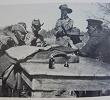This Day in History: July 9, 1915
Additional Date: July 9, 1915
On 9 July 1915 the Imperial German Forces officially surrendered to General Louis Botha’s troops at the Khorab Memorial. This followed the outbreak of the First World War on 1 August 1914.
On 25 December 1914 General Louis Botha led South African troops across Walvis Bay into German South West Africa to fight against Imperial German Forces. In May of the following year, German troops sought a treaty with the South Africans that would permit them to keep the northern area of the territory. By this time the South African troops had accumulated a force of 35,000 men within the territory; they declined the German’s proposition and insisted on an unconditional surrender.
As per agreement between the parties involved, a train carrying the Governor of German South West Africa accompanied by Schutztruppe Major Victor Frank arrived at a point known as Kilometre 500, north of Otavi. They were met by South Africa’s General Louis Botha, Colonel de Waal, Major Bok, Major Esselen and Major Leish. The treaty that saw the end of German rule in South West Africa (now known as Namibia) was signed by General Louis Botha, Governor Seitz and Major Victor Franke.
The Treaty became known as The Treaty of Khorab.
References:
Paterson H. (n.d.), ‘The South African Campaign in German South-West Africa, 1914 – 1915’ from South African Military History Society [online] Available at www.samilitaryhistory.org [Accessed: 05 July 2011]
Anon, (n.d.), ‘Otavi Namibia’ from Namibia [online] Available at www.namibia-1on1.com [Accessed: 5 July 2011]
